‘A Colombian Wild West’: Inside Maicao’s Arab community
Maicao, once the thriving heart of Colombia’s Arab community, faces population decline amid a slowing border economy.
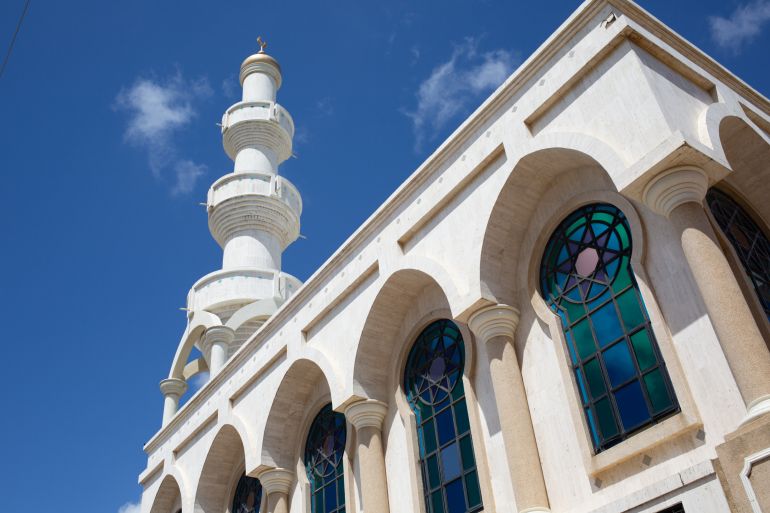
Maicao, Colombia – As local vendors sell their goods in the busy market streets of Maicao, the bustle is suddenly interrupted by an Arabic call to prayer.
The call, known as the adhan, emanates from the minaret of the local Omar Ibn Al-Khattab mosque, an imposing building of Italian marble rising above the small border city.
Keep reading
list of 3 itemsColombia peace talks with ELN rebels resume amid tensions
Colombians take to the streets in favour of healthcare reforms
As the blistering midday sun beats down, Muslims head to the mosque, guided by the adhan, which floats over the cacophony of rickshaws and shouts about yuca and tomato prices.
The mosque — among the largest in Latin America — is the centrepiece for one of Colombia’s most important Muslim and Arab communities. But it is a community in crisis, as trade with neighbouring Venezuela falters and its population declines.
“Maicao is not what it should be for being a border town. The situation is critical,” says Pedro Delgado, a researcher who studies the city’s Muslim community and has converted to Islam himself.
But those who remain in the city express pride in their community. Mayor Mohamad Jaafar Dasuki, the first and only Muslim person to lead a city in Colombia, calls his time overseeing Maicao an “honour”. His term, which began in 2020, is set to end this year.
Dasuki believes Maicao still has an important role to play in dispelling stereotypes within the otherwise heavily-Catholic country.
“We have a responsibility to generate a perception for those who think Muslims are terrorists or Colombians are drug dealers — that through our actions we can show this is a disgrace and a bad perception,” he told Al Jazeera, his Spanish punctuated by a thick Arab accent.
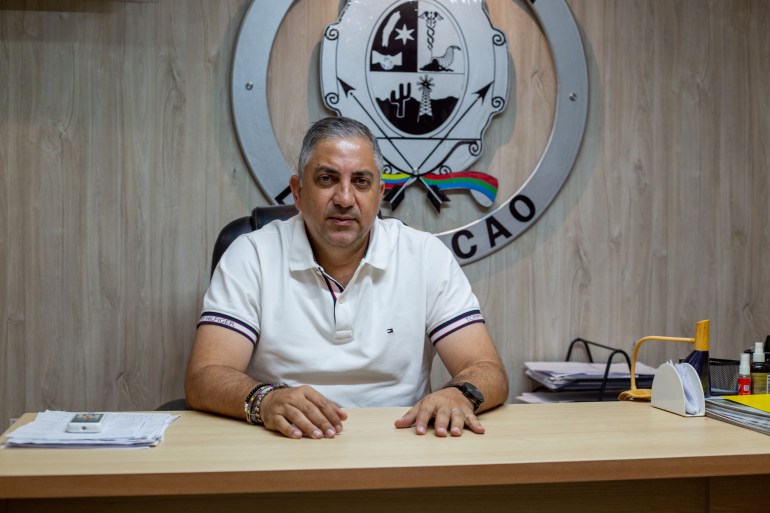
A diaspora propelled by civil war
Arabs and Muslims arrived throughout Latin America following the demise of the Ottoman Empire in the early 20th century, though few settled in Colombia then.
It was the onset of Lebanon’s civil war in the 1970s that sent waves of asylum seekers across the Caribbean and Colombia, driving the growth of Maicao’s Arab community.
“They realised that there was a great network of possibilities in ports across the Caribbean,” said Diego Castellanos, a historian studying Latin American Muslim communities at the French Institute for Anatolian Studies. “And that exploration brought some to Maicao.”
Omar Dabage was among them. He arrived in Colombia on December 10, 1971, initially settling in the port city of Barranquilla. He spent a few years as a travelling merchant, selling textiles on the street, before relocating to Maicao in 1974.
“I used to work the land but there was no work for me back home. I prefer Maicao to my hometown,” the 73-year-old said with a grin as he sipped ginger tea from a small plastic cup.
Maicao’s Arab community remains largely Lebanese, with residents of Syrian and Palestinian descent as well. And in the 1970s, new arrivals found prosperity in the border town: Venezuela was on the cusp of an oil boom and Maicao was just a stone’s throw away.
The town bloomed in the economic upturn. Nestled in the arid plains of the Colombian province of La Guajira, it had historically been a prominent hub for business — licit and illicit — and the largely unregulated border nearby enticed new arrivals with economic opportunities.
“Back then, Maicao was a town where many things were lacking but it had a large presence of contraband,” Castellanos, the historian, explained.
“Above all, there was a framework of illegality that allowed those who arrived without documents to settle and begin to produce economically. Maicao began to be seen as a prosperous yet very dangerous place.”
With armed groups and paramilitary forces clashing for control of the area, Castellanos described Maicao at the time as “a Colombian Wild West”.
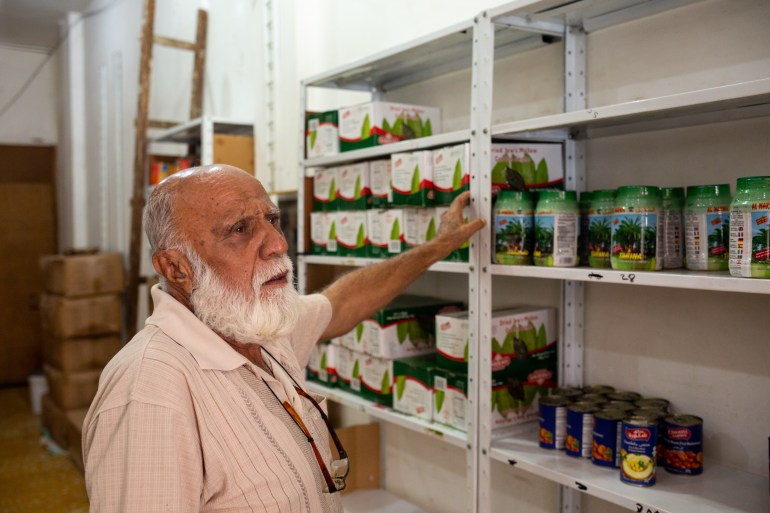
A flourishing Arab community
Trade across the porous Colombian-Venezuelan border allowed Maicao’s Arab community to flourish. Businesses with names like Walid, Hassuna and Safadi soon peppered the city’s web of commercial streets, offering goods like appliances, perfumes and textiles.
In 1997, the community completed its crowned jewel: the Omar Ibn Al-Khattab mosque. Decorated with turquoise stained-glass windows, the mosque offers a flash of colour in the otherwise dusty town — not to mention a welcome shelter from the sun’s merciless rays.
During its heyday in the late 1990s, it was rumoured that Maicao’s mosque got so busy that the faithful spilled out into the street, offering Ramadan prayers from the sidewalk.
It remains the third largest mosque in Latin America — though some claim it is, in fact, the second biggest, dwarfed only by mosques in big metropolises like Buenos Aires and Caracas.
For Samira Hajj Ahmad, who has run a nearby electronic shop for 41 years, the mosque is the heart of the community.
“It’s tradition, it’s our pride and our religion,” she said as she swept the shop steps along a lively commercial street, her cheerful eyes peeking out from her black hijab. “Without the mosque, there would be no unity, no wisdom, no conscience to be who we are. It’s everything for us.”
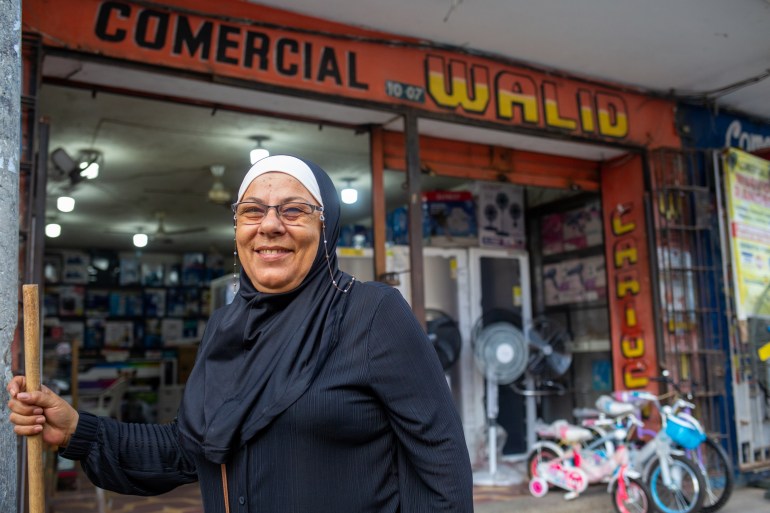
A population in steep decline
The Dar El Arkam school, situated next door to the mosque, shows no outward signs of the changing circumstances the community faces.
Its halls are lined with photographs of graduating classes from across the years, labelled with a mix of surnames — some typically Hispanic, others traditionally Arab.
But classes have shrunken recently. In the 1990s, the school housed between 800 to 1,200 students across two centres, with about 15 percent having no Arab roots whatsoever.
Now, the school has only 252 students, while its preschool and primary school have closed down, their buildings rented out to keep the rest of the establishment afloat.
The diminishing class sizes reflect the overall falling population. Though precise figures are disputed, the Arab community in Maicao counted as many as 5,000 to 8,000 residents at its height in the 1990s.
Its current population has plummeted to about 1,000, according to local media reports. The mayor claims the total may be closer to 3,000 — though researchers like Delgado say that figure is “exaggerated”.
“There’s few of us left here in Maicao,” said the head of the mosque, Hussein Omais Barrera, as he sat in the empty carpeted hall. “It’s saddening. There was a large community before and now it’s dwindled. It makes one sad, having been born and raised in Maicao, to see people leave in search of other options.”
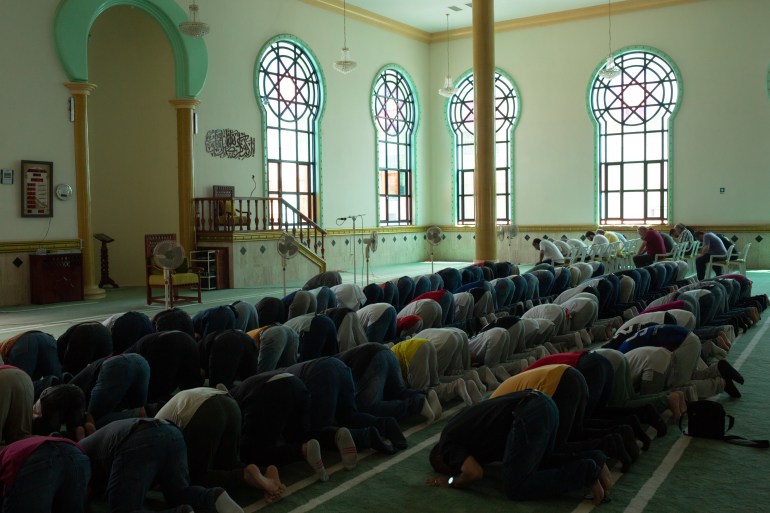
Economic collapse and a rise in crime
The blossoming trade opportunities that brought many Arabs to Maicao have now withered, hampered by Venezuela’s total economic collapse.
The rise of socialist leaders like Hugo Chávez and Nicolás Maduro in Venezuela also led to friction across the border. Political tensions with Colombia’s formerly conservative government resulted in border closures and crackdowns on imports and migration, measures that stymied Maicao’s economy.
Only recently, with the 2022 election of Colombia’s first left-wing president, Gustavo Petro, have relations between the two countries eased. In January, Venezuela and Colombia committed to fully reopening their shared border, and in February, they signed a new trade agreement.
But Maicao’s decline was also spurred by a wave of crime in the 1990s as the Revolutionary Armed Forces of Colombia (FARC), a now-disbanded rebel group, clashed with rivals in the area.
Money laundering surged amid the conflict, as did incidents of violent crime like kidnapping and extortion.
“Maicao became immersed in a crisis of insecurity, and the lack of control from the state made it a total disorder. People preferred to leave instead of risking their lives,” the researcher Delgado explained.
Adnan Said, a local business owner originally from Lebanon, was among those kidnapped in the crime wave. In 1996, he and his wife were driving home from the nearby city of Valledupar when an armed group stopped their car, abducting the couple for eight days.
He and his wife were ultimately released unharmed, though their captors tried to extort a ransom in exchange for their freedom. Said said he imagines the kidnapping “was for economic reasons”.
But he noted that violence and economic instability were the reasons he left Lebanon in the first place.
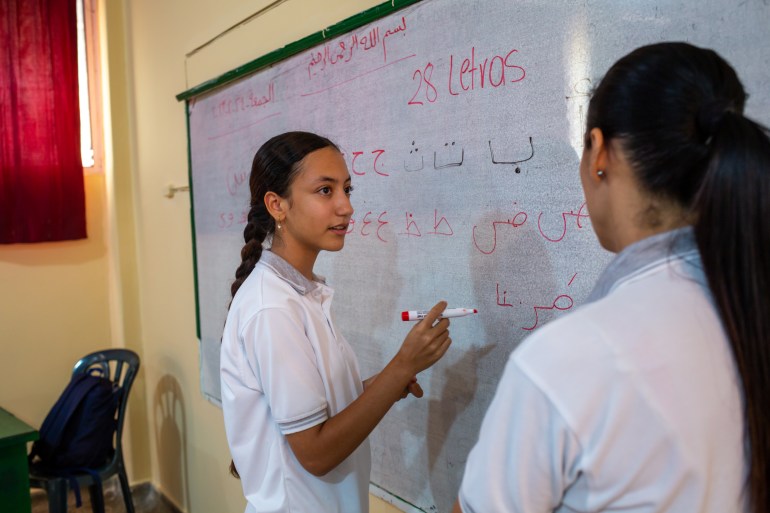
The Arab community nowadays is a remnant of what it once was. But even as new generations move away to seek better opportunities, the historian Castellanos believes the community has left an indelible mark on Maicao.
“It’s not that all of Maicao’s Muslims will leave,” said Castellanos. “There will always be a core that remains. But at some point, the [Arab] institutions and elites will dissolve, and the Muslim and Arab traces will become simply an element of prestige, of distinction.”